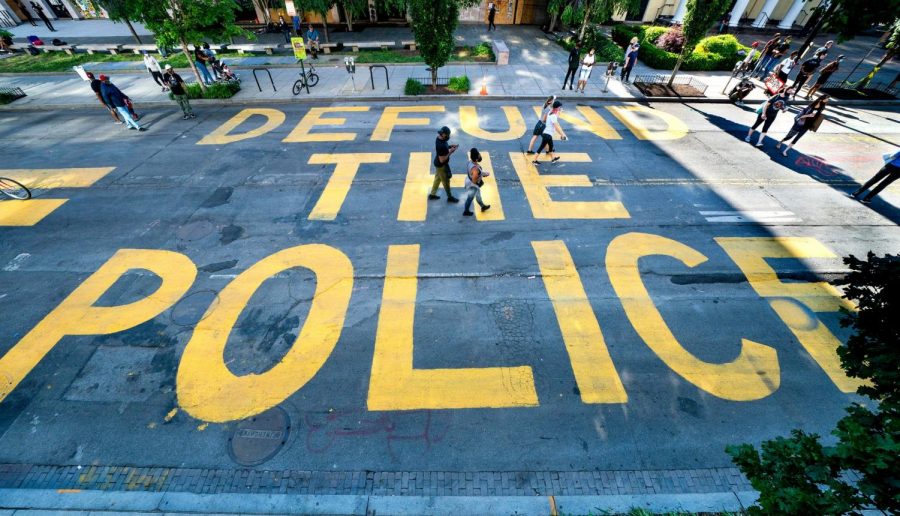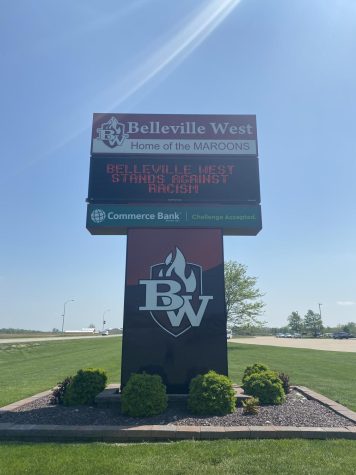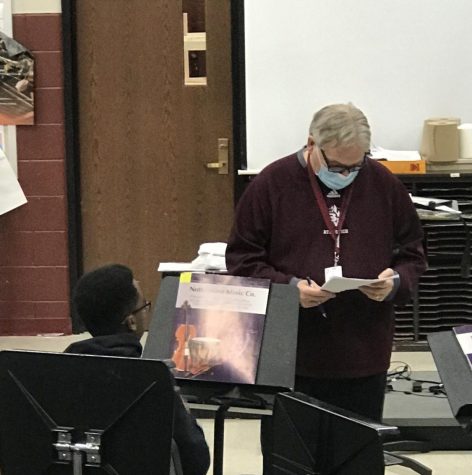What “Defunding The Police” Means and Why It’s Is The Right Thing To Do
Protesters in Washington write “Defund the Police” on the street.
July 14, 2020
Following the killing of George Floyd and Breonna Taylor, at protests around the country, one of the calls to action is to “defund the police.” For those who may not understand the message, this demand makes it sound like there would be no law enforcement at all and conjures up images of lawlessness and anarchy. Some have even likened a world without police to the movie “The Purge.” But that’s not what the message is about.
Defunding the police is not about eliminating police departments entirely. You will still be able to call for help if someone steals your car. You will likely still get a ticket for speeding. You will still be able to call for help if your business, home, or life is in danger. The difference is that police departments would be funded, but they would not be overfunded.
By defunding the police, city budgets would turn from providing armored vehicles and military grade weapons to law enforcement, and instead spend that money investing in the community it serves. According to the Charles Koch Institute, “the Department of Defense’s 1033 program has provided local law enforcement agencies access to military-grade equipment.” Their studies further indicated that “Over 8,000 law enforcement agencies have utilized the 1033 program to access more than $6 billion worth of military equipment such as night-vision goggles, machine guns, armored vehicles, bayonets, grenade launchers, and military aircraft.”
The list begs the question “Why would a small town police department need machine guns or grenade launchers to enforce local laws?” Tear gas is also available through this government program but, according to the 1925 Geneva Convention is classified as chemical warfare and therefore a war crime when used in battle, should never be used on our own citizens. There are more long-term, positive benefits of using that $6 billion dollars through other programs that don’t result in that don’t result in serious bodily injury or death.
For example, money that has previously been spent on ineffective mental health training for police, can instead be spent on mental health resources and forming new partnerships between police departments and local mental health professionals. According to the Journal of the American Academy of Psychiatry and the Law, “Approximately 1,000 people in the United States were fatally shot by police officers during 2018, and people with mental illness were involved in approximately 25 percent of those fatalities.” Crisis Intervention Teams (CIT) are costly, and offer modest results according to a study conducted by the College of Nursing, University of Kentucky, Lexington, and the Mood Disorders Research Program, Department of Psychiatry and Behavioral Sciences, University of Louisville School of Medicine, Louisville, Kentucky. “Based on an average of 2400 CIT calls annually, the overall costs associated with CIT per year were $2,430,128 ($146,079 for officer training, $1,768,536 for hospitalizations of patients brought in by CIT officers, $508,690 for emergency psychiatry evaluations, and $6823 for arrests).”
Despite this investment in trying to make those who direct traffic somehow capable of dealing with complex mental illnesses and those who may be acting as a result of that condition, Connecticut police, as an example, have killed 21 people in the last five years, all of whom were considered Emotionally Disturbed Persons (EDP). It’s not hard to understand. Police are not counsellors! Psychologists, psychiatrists, and licensed social workers spend years of studying to obtain licensing in their field. In contrast, police undergo a few hours of training every year.
Think of it this way. If you needed to have life saving surgery, would you want a licensed surgeon or the guy who cleans the operating room doing your surgery? In this case, imagine a situation where your brother, mother, sister, father, aunt, or uncle suffers from schizophrenia. They’re threatening an innocent person because their disease makes them think that someone is out to get them. They truly believe their life is in danger and that possibly harming someone else is their only way to save their own life.
In Illinois, law enforcement is only required to attend a 40 hour course AFTER two years of field experience according to the Illinois Law Enforcement Training And Standards Board. If it were you, your loved one, would you want a cop with 40 hours training in mental health issues or a medical professional with years of first hand experience resolving the situation?
Defunding the police reallocates money that is spent in mental health training and instead spends that money on developing partnership programs where situations involving what police refer to as “emotionally disturbed persons” or “EDPs” a professional is called to the scene to assist police in assessing and de-escalating the situation. Since 2016, Denver has had professionally trained social workers responding with police officers to calls involving EDPs. According to an article in The Denverite, they have 14 social workers on staff at the department, and in 2018, “clinicians made contact with 1,725 people, according to city documents. Of those people, 3 percent were arrested and 2 percent were either ticketed or given a citation. About a quarter of people contacted by clinicians went on to the Mental Health Center for support and recovery.”
Defunding the police also means investing more in taking preventative measures instead of reactive measures that can go tragically wrong. Instead of spending money on vehicles that can do 120 mph on tires that never go flat, cities could spend that money on social services like after school resources run by professionals and volunteers can keep kids off the streets and out of trouble.
The After School Alliance published a study of the Bayview Safe Haven in San Francisco, California proving that the recreational center resulted in fewer police calls. It also noted that those young adults who participated in programs at the Bayview Safe Haven, even those who had juvenile criminal records, were less likely to be offenders or to reoffend.
Defunding the police also means that more money can be spent on social programs. Social workers, along with mental health professionals and after school programs, play a pivotal role in our society in potentially curbing crime, especially in communities with a high number of homes that fall below the poverty line, teen parents, or single parent households. Increasing funding for social programs like parenting classes, household budgeting, and respite child care can provide these households a new way to function.
According to a study done by the Canadian Council on Social Development, “social interventions can yield positive, measurable benefits within three years, with reductions in crime of 25% to 50% within 10 years.” Closer to home, a study conducted by Cynthia L. Rowe, Research Associate Professor, University of Miami School of Medicine, Department of Epidemiology and Public Health, Center for Treatment Research on Adolescent Drug Abuse found that a Multidimensional Family Therapy program based on the recognition that many factors contribute to drug use initiation and drug abuse, including social–cognitive factors, psychological functioning, values and beliefs, family and peer factors, and environmental and social–cultural influences resulted in reduced recidivism, and showed promising results for reducing antisocial behavior and substance use, and improving psychological functioning and school performance.
The movement to defund the police is not about eliminating the police department entirely, but about rethinking the role law enforcement plays in our society. Defunding the police, as a movement, is focused on reallocating money typically spent on issues that police shouldn’t be handing to start with. Prevention, intervention, and social services are not a matter for law enforcement. Police should be focused on crime and criminals. Changing how law enforcement is funded allows new partnerships with mental health professionals, new opportunities to provide prevention programs, and worthwhile social services that can benefit the entire community.
The time is now to defund the police and reinvest in our cities and citizens.












Rachael Rosenstengel • Aug 13, 2020 at 12:39 pm
Hello Mason. I just read your article about defunding the police, and this makes total sense to me. Too often, “defunding the police” may get spun around into outright removing the police, and that would be bad. This article gives a clear difference between allocating funding and complete police removal.